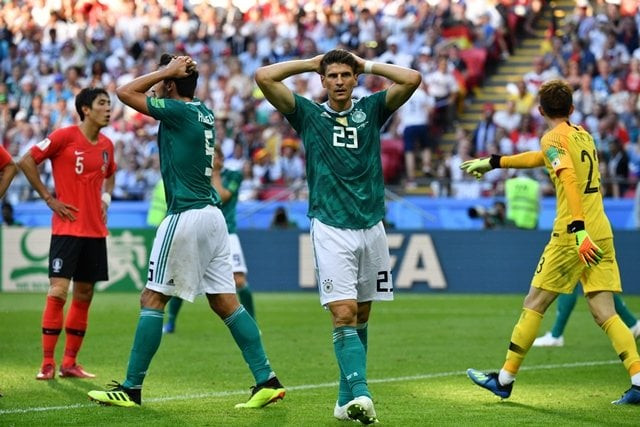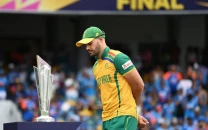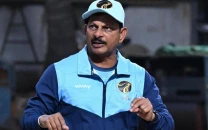The fall of the German machine
The ruthlessness, efficiency and resilience of four years ago seems to have forsaken Germany

PHOTO: AFP
How else do you explain their phenomenal record at the World Cup? How else do you explain a team going to Brazil and defeating football’s greatest nation 7-1 in their own backyard? How else do you explain a side that had never before been knocked out in the group stages? How else do you explain four World Cup triumphs, most of them against the odds?
But against South Korea, that jersey may well have been made of lead, so heavily did it weigh down the usually ruthless Die Mannschaft.
On Wednesday, an empire fell.
The insipid showing against South Korea is difficult to comprehend but it was in keeping with the pattern of their other performances in 2018.
The Germans may not have individual brilliance of Messi, Ronaldo or Neymar’s ilk but the sum of their parts has been greater than Argentina, Portugal and Brazil — both in terms of playing eleven and the 23-man squad. This is a team built around the entire squad rather than a few players of exceptional brilliance.
But, inexplicably, the German machine failed to click; perhaps brought down by a deadly mixture of added expectations and complacency. The same players that usually click so seamlessly into place when they come together for Germany looked like they had never played with each other before.
Defending champions Germany crash out of World Cup at group stage
The ruthlessness, efficiency and resilience of four years ago seemed to have forsaken them. All that remained in their wake was a team devoid of both rhythm and innovation.
“For us, the pressure feels great,” the talismanic Thomas Muller had said in an interview before the Sweden game.
A late Toni Kroos winner — one of the best goals of the tournament — resumed normal service for a while. The Germans were back, back from the brink; rising like always. Never write off the Germans.
But there was to be no rally. Only more of the same. The Kroos moment did not transform the entire landscape like many expected it to, instead it merely planted a rose in the arid desert — one of the only fond memories of Germany’s worst-ever World Cup campaign.
This was the first time that the Germans failed to score in the first half of all three opening group matches. This was the first time that the Germans failed to top their group; instead finishing dead last. In all three games, Germany were chasing the game going into the second half.
What was particularly galling was the way it was Germany’s finest that let them down. Against Korea, Mesut Ozil created more chances than any other player has created in any game. Yet none of them found the back of the net as Germany’s typical strengths — ruthlessness and efficiency — became their most glaring weaknesses.
Mats Hummels and Mario Gomez missed clear chances and will now forever be haunted by that most merciless of questions: what if? Germany’s interpreter of space and World Cup hero, Muller, failed to connect with any of his teammates when he came on from the bench. Joshua Kimmich ignored his defensive duties time and again. In the stands, the now retired Miroslav Klose showed no emotion, what would Germany have given for the record goalscorer’s services.
Midfield maestro Kroos was the last German to walk off the pitch; unable to comprehend what had happened. Just like the rest of us.
There was always something about that Germany jersey. It used to turn men into monsters, Davids into Goliaths, mere mortals into legends. But in Kazan, that image shattered. Something, somewhere, somehow, just broke.



















COMMENTS
Comments are moderated and generally will be posted if they are on-topic and not abusive.
For more information, please see our Comments FAQ